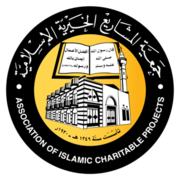Association of Islamic Charitable Projects جمعية المشاريع الخيرية الإسلامية Jamʿīyah al-Mashārīʿ al-Khayrīyah al-ʾIslāmīyah | |
|---|---|
 | |
| Leader | Shaykh Hussam Qaraqira |
| Founded | 1930s (as the Association of Islamic Charitable Projects) 1983 (as Al-Ahbash) |
| Headquarters | Various |
| Ideology | Pragmatism Religious pluralism Anti-Salafi |
| Religion | Sunni neo-traditionalism (Ash'ari, Rifaʽi, Sufi) |
| National affiliation | March 8 Alliance |
| Parliament of Lebanon | 2 / 128 |
| Website | |
| www projectsassociation | |
Al-Ahbash (Arabic: الأحباش, al-aḥbāsh, English: "The Ethiopians"), also known as the Association of Islamic Charitable Projects (Arabic: جمعية المشاريع الخيرية الإسلامية, Jamʿīyah al-Mashārīʿ al-Khayrīyah al-ʾIslāmīyah, AICP)[1] is a neo-traditionalist Sufi religious movement and, in Lebanon, political party, which was founded in the mid-1980s.[2] The group follow the teachings of Ethiopian scholar Abdullah al-Harari.[2] Due to the group's origins and activity in Lebanon, the Ahbash have been described as the "activist expression of Lebanese Sufism."[3]
The Ahbash have been noted for their ardent criticism of conservative strains of Islam, including the Salafi movement and Wahhabism.[4][1] The movement has been described as one of the "most controversial Muslim associations" among modern Islamic groups[3] and, within Sunni Islam, opponents of the Ahbash have frequently referred to the movement as unorthodox and deviant.[4][5]
- ^ a b Kabha, Mustafa; Erlich, Haggai (2006). "Al-Ahbash and Wahhabiyya: Interpretations of Islam". International Journal of Middle East Studies. 38 (4). United States: Cambridge University Press: 519–538. doi:10.1017/s0020743806412459. ISSN 0020-7438. JSTOR 4129146. S2CID 55520804.
- ^ a b Seddon, David (2004). A political and economic dictionary of the Middle East (1st ed.). Routledge. p. 22. ISBN 978-1857432121.
- ^ a b Hamzeh, A. Nizar; Dekmejian, R. Hrair (1996). "A Sufi Response to Political Islamism: Al-Ahbash of Lebanon". International Journal of Middle East Studies. 28. Beirut: American University of Beirut: 217–229. doi:10.1017/S0020743800063145. S2CID 154765577. Retrieved 10 April 2009.
- ^ a b Maasho, Aaron (11 May 2012). "Ethiopian Muslims protest government 'interference'". Reuters Africa. Archived from the original on 13 May 2012.
- ^ Abbink, Jon (3 July 2014). "Religious freedom and the political order: the Ethiopian 'secular state' and the containment of Muslim identity politics". Journal of Eastern African Studies. 8 (3): 346–365. doi:10.1080/17531055.2014.917855. hdl:1887/27585. ISSN 1753-1055. S2CID 33389563.